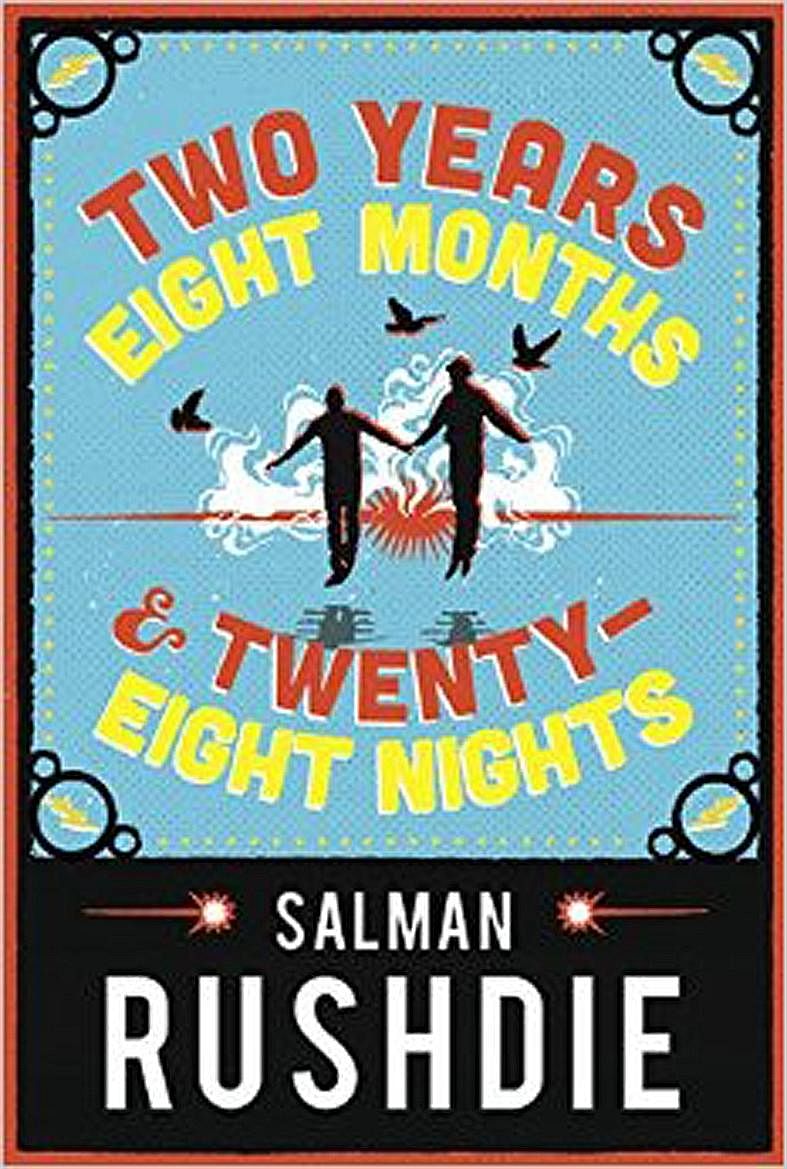FICTION
TWO YEARS EIGHT MONTHS & TWENTY-EIGHT NIGHTS
By Salman Rushdie
Jonathan Cape/Hardcover/$46.27 to pre-order from Books Kinokuniya/3/5
In his first novel in seven years, Salman Rushdie has elected to write about a magical war between jinns and humans - a tale featu- ring a levitating gardener, a lightning princess and blood-thirsty ifrits. But, make no mistake, Two Years Eight Months & Twenty- Eight Nights (the title itself a reference to 1,001 Nights, of Indian and Middle Eastern lore) is as much a story as a political stand.

Narrated by an amorphous "we" from the future, the novel starts in 1195 with a love affair between the Cordoba-born philosopher Averroes or Ibn Rushd (who really did exist) and a jinnia or female jinn, a magical creature of smoke and fire, named Dunia (who probably did not).
With Dunia, Ibn Rushd sire a multitude of children, a tribe dubbed the Dunia-zat.
He subsequently dies and his quarrel about God, reason and causality with the Muslim theologian, Ghazali of Tus, remains unresolved.
Fast forward more than 800 years, circa today, and a great storm has hit Manhattan.
In the aftermath, a gardener named Mr Geronimo - formerly Raphael Hieronymus Manezes of Bandra, Bombay, the illegitimate son of a Catholic priest, but also a descendant of Rushd and Dunia - discovers that his feet no longer touch the ground.
Far from a miracle, this becomes Mr Geronimo's curse, as the old widower struggles to stay connected to his beloved soil and plants, hardly leaving his apartment in a bid to escape notice and abuse.
Sequestered, he wonders unhappily if his condition is a symptom of his displacement from his birth place and past.
It is tempting to read into Mr Geronimo aspects of the author's own biography. Bombay-born Rushdie, whose father adopted the new family name in honour of Averroes, famously went into hiding for years after the Ayatollah Khomeini issued a fatwa against him in 1989.
Since 2000, according to his Wikipedia entry, the British author has resided in New York City.
Yet, even as it is eloquent about Mr Geronimo's origins and his longing for a Bombay that no longer exists except in his imagination, the novel has other ideas.
What eventually unfolds is a quasi-historical account of "the War of the Worlds", the conflict between Ibn Rushd and Ghazali taken beyond the grave, played out by a bunch of proxies, including a tax accountant-turned-superhero, a woman who shoots lightning from her fingers a la Emperor Palpatine, and assorted low- and high-level jinns from a parallel universe called Fairyland.
Rushdie remains a satiric yarn- spinner of the highest order and his sci-fi-meets-creature-feature mash -up of an end-of-days Manhattan is capable of raising chuckles (a sea monster swallows the Staten Island ferry, and the President, described as a handsome chap even though a little jug-eared, finds it difficult for the first time to reassure his fellow Americans).
Religion and politics, and their bad union, come in for a skewering. When an avant-garde music composer goes on late-night American television to argue that the Supreme Being is fictional, but has now decided to torment humanity with very real ills, he spouts a line that is seemingly rubbish but rings true in the current climate of religious extremism and terrorism: "The triumph of the destructive irrational manifests itself in the form of an irrationally destructive god."
In other words, unreason in men has led them to dream up a god to justify their ridiculous actions. At one point, as if to mirror the absurdity of life and the fragility of reason, the narrative itself breaks down into a series of truncated anecdotes, peeling apart like onion skins.
Like The Enchantress Of Florence (2008), the novel preceding it, Two Years Eight Months takes a leaf from Italian writer Italo Calvino. Perhaps, as a clever attempt to head off any criticism, Rushdie quotes Calvino in one of Two Years Eight Months' epigraphs: "Instead of making myself write the book I ought to write, the novel that was expected of me, I conjured up the book I myself would have liked to read, the sort by an unknown writer, from another age and another country, discovered in an attic."
Indeed, the reader and fan of earlier Rushdie works, such as Midnight's Children (1981) and its evocative enigmas rooted in beautiful everyday details, should consider themselves warned.
While magic realism remains his stock in trade, Rushdie's characters here come across as under-written, moved about like pawns in the war waged by dead philosophers and powerful spirits. This novel is one of ideas, trading in smoke, flames and mirrors. In letting the genies (or jinns) out of the bottle, to let the world's unstoppable decline play out on the page, Rushdie shows that reason will ultimately prevail - at the expense of dreams and imagination.
If you like this, read: The Golem And The Jinni by Helene Wecker (2013, Harpercollins, paperback, $19.26 from Books Kinokuniya), about a friendship that transcends race, religion and mythical states.


